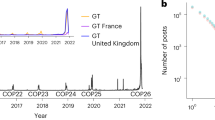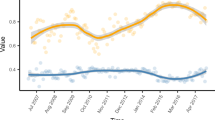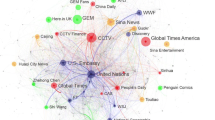Abstract
Climate change research describes online discourse as sharply polarized, echoing real-world divides in society. Yet while polarization in online climate change discourse has been extensively studied in terms of isolated communities and echo chambers, less is known about the extent of affective polarization that characterizes the hostile nature of intergroup interactions. Utilizing a combination of machine learning and network science tools, we design a methodological pipeline that quantifies the extent to which stance groups interact with more negative sentiment toward out-group members than in-group members. We apply this framework to 100 weeks of Twitter discourse about climate change. We find that deniers of climate change (Disbelievers) are more hostile towards people who believe (Believers) in the anthropogenic cause of climate change than vice versa. We also observe that Disbelievers use more words and hashtags related to natural disasters during more affectively polarized weeks as compared to Believers. Finally, using vector autoregression analysis, we find that climate anomalies in terms of both severe temperature and storms predict asymmetric shifts in online climate change discourse: Disbelievers grow more hostile toward out-groups, while Believers become less affectively polarized. These findings resonate with prior work on the asymmetric nature of polarization in contentious discourse, both around climate change and beyond. Our work also extends existing findings around temporal associations between climate anomalies, divided media representations, and real-world conflicts. We conclude with implications for science communication and studying affective polarization in online discourse, especially concerning the subject of climate change.



Similar content being viewed by others
Notes
We randomly sampled 1000 users from each group to manually validate the results. We label a user as Disbeliever if we find any Tweet akin to someone who does not believe in climate change or anthropogenic cause of climate change. Otherwise, we label the user as Believer. We observe that the average precision from manual validation of 2000 users is 81.2%. We use the parameter values as defined in Kumar (2020) as \(k = 5000, p = 5000, \theta (I) = 0.1, \theta (U) = 0.0, \theta (T) = 0.7\).
For more information, please refer to (Heider 2013).
References
Anderson AA, Huntington HE (2017) Social media, science, and attack discourse: how Twitter discussions of climate change use sarcasm and incivility. Sci Commun 39(5):598–620
Banks A, Calvo E, Karol D, Telhami S (2020) #Polarizedfeeds: three experiments on polarization, framing, and social media. The International Journal of Press/Politics, p 1940161220940964
Barberá P, Casas A, Nagler J, Egan PJ, Bonneau R, Jost JT, Tucker JA (2019) Who leads? Who follows? Measuring issue attention and agenda setting by legislators and the mass public using social media data. Am Polit Sci Rev 113(4):883–901
Barberá P, Jost JT, Nagler J, Tucker JA, Bonneau R (2015) Tweeting from left to right: is online political communication more than an echo chamber? Psychol Sci 26(10):1531–1542
Bolsen T, Shapiro MA (2018) The US news media, polarization on climate change, and pathways to effective communication. Environ Commun 12(2):149–163
Brady WJ, Wills JA, Jost JT, Tucker JA, Van Bavel JJ (2017) Emotion shapes the diffusion of moralized content in social networks. Proc Natl Acad Sci 114(28):7313–7318
Buhaug H, Nordkvelle J, Bernauer T, Böhmelt T, Brzoska M, Busby JW, Ciccone A, Fjelde H, Gartzke E, Gleditsch NP et al (2014) One effect to rule them all? A comment on climate and conflict. Clim Change 127(3):391–397
Carley LR, Reminga J, Carley KM (2018) ORA and netmapper. In: International conference on social computing, behavioral-cultural modeling and prediction and behavior representation in modeling and simulation. Springer, New York
Carmichael JT, Brulle RJ (2017) Elite cues, media coverage, and public concern: an integrated path analysis of public opinion on climate change, 2001–2013. Environ Polit 26(2):232–252
Darwish K (2019) Quantifying polarization on Twitter: the Kavanaugh nomination. International conference on social informatics. Springer, New York, pp 188–201
Demszky D, Garg N, Voigt R, Zou J, Shapiro J, Gentzkow M, Jurafsky D (2019) Analyzing polarization in social media: method and application to tweets on 21 mass shootings. In: Proceedings of NAACL. Association for computational linguistics, Minneapolis, Minnesota, pp 2970–3005
Druckman JN, Levendusky MS (2019) What do we measure when we measure affective polarization? Public Opin Q 83(1):114–122
Dunlap RE, McCright AM, Yarosh JH (2016) The political divide on climate change: partisan polarization widens in the US. Environ Sci Policy Sustain Develop 58(5):4–23
van Eck CW, Mulder BC, Dewulf A (2020) Online climate change polarization: interactional framing analysis of climate change blog comments. Sci Commun p 1075547020942228
Evans GW (2019) Projected behavioral impacts of global climate change. Annu Rev Psychol 70:449–474
Fisher DR, Waggle J, Leifeld P (2013) Where does political polarization come from? Locating polarization within the US climate change debate. Am Behav Sci 57(1):70–92
Garimella K, Morales GDF, Gionis A, Mathioudakis M (2018) Quantifying controversy on social media. ACM Trans Soc Comput 1(1):1–27
Geschke D, Lorenz J, Holtz P (2019) The triple-filter bubble: using agent-based modelling to test a meta-theoretical framework for the emergence of filter bubbles and echo chambers. Br J Soc Psychol 58(1):129–149
Hamilton LC, Hartter J, Lemcke-Stampone M, Moore DW, Safford TG (2015) Tracking public beliefs about anthropogenic climate change. PLoS ONE 10(9):e0138208
Heider F (2013) The psychology of interpersonal relations. Psychology Press, Hove
Hitchcock FL (1941) The distribution of a product from several sources to numerous localities. J Math Phys 20(1–4):224–230
Hsiang SM, Burke M (2014) Climate, conflict, and social stability: what does the evidence say? Clim Change 123(1):39–55
Huang B, Ou Y, Carley KM (2018) Aspect level sentiment classification with attention-over-attention neural networks. In: International conference on social computing, behavioral-cultural modeling and prediction and behavior representation in modeling and simulation. Springer, New York, pp 197–206
Jang SM, Hart PS (2015) Polarized frames on climate change and global warming across countries and states: evidence from Twitter big data. Glob Environ Chang 32:11–17
Jenkins-Smith HC, Ripberger JT, Silva CL, Carlson DE, Gupta K, Carlson N, Ter-Mkrtchyan A, Dunlap RE (2020) Partisan asymmetry in temporal stability of climate change beliefs. Nat Clim Chang 10(4):322–328
Jost JT (2017) Ideological asymmetries and the essence of political psychology. Polit Psychol 38(2):167–208
Kahan DM, Jenkins-Smith H, Tarantola T, Silva CL, Braman D (2015) Geoengineering and climate change polarization: testing a two-channel model of science communication. Ann Am Acad Pol Soc Sci 658(1):192–222
Karlsen R, Steen-Johnsen K, Wollebæk D, Enjolras B (2017) Echo chamber and trench warfare dynamics in online debates. Eur J Commun 32(3):257–273
Koubi V (2019) Climate change and conflict. Annu Rev Polit Sci 22:343–360
Krackhardt D, Stern RN (1988) Informal networks and organizational crises: an experimental simulation. Soc Psychol Quart 51:123–140
Kumar S (2020) Social media analytics for stance mining a multi-modal approach with weak supervision. Ph.D. thesis, Carnegie Mellon University
Massey FJ Jr (1951) The Kolmogorov–Smirnov test for goodness of fit. J Am Stat Assoc 46(253):68–78
Matakos A, Terzi E, Tsaparas P (2017) Measuring and moderating opinion polarization in social networks. Data Min Knowl Disc 31(5):1480–1505
McCright AM, Dunlap RE (2011) The politicization of climate change and polarization in the American publics views of global warming, 2001–2010. Sociol Q 52(2):155–194
Milfont TL, Wilson MS, Sibley CG (2017) The publics belief in climate change and its human cause are increasing over time. PLoS ONE 12(3):e0174246
Morales A, Borondo J, Losada JC, Benito RM (2015) Measuring political polarization: Twitter shows the two sides of Venezuela. Chaos Interdiscip J Nonlinear Sci 25(3):033114
Morstatter F, Pfeffer J, Liu H, Carley KM (2013) Is the sample good enough? Comparing data from Twitter’s streaming API with Twitter’s firehose. In: Proceedings of the 7th international AAAI conference on weblogs and social media, ICWSM 2013. AAAI press, pp 400–408
Pianta S, Sisco MR (2020) A hot topic in hot times: how media coverage of climate change is affected by temperature abnormalities. Environ Res Lett 15(11):114038
Ramdas A, Trillos NG, Cuturi M (2017) On Wasserstein two-sample testing and related families of nonparametric tests. Entropy 19(2):47
Stewart LG, Arif A, Starbird K (2018) Examining trolls and polarization with a retweet network. In: Proceedings of the ACM WSDM, workshop on misinformation and misbehavior mining on the web
Toda HY, Phillips PC (1994) Vector autoregression and causality: a theoretical overview and simulation study. Economet Rev 13(2):259–285
Tyagi A, Babcock M, Carley KM, Sicker DC (2020) Polarizing tweets on climate change. In: International conference on social computing, behavioral-cultural modeling and prediction and behavior representation in modeling and simulation. Springer, New York, pp 107–117
Tyagi A, Carley KM (2020) Divide in vaccine belief in Covid-19 conversations: implications for immunization plans. medRxiv
Tyagi A, Field A, Lathwal P, Tsvetkov Y, Carley KM (2020) A computational analysis of polarization on Indian and Pakistani social media. Social informatics. Springer, New York
Uyheng J, Carley KM (2020) Bot impacts on public sentiment and community structures: comparative analysis of three elections in the Asia-Pacific. In: International conference on social computing, behavioral-cultural modeling and prediction and behavior representation in modeling and simulation. Springer, New York, pp 12–22
Uyheng J, Magelinski T, Villa-Cox R, Sowa C, Carley KM (2019) Interoperable pipelines for social cyber-security: assessing Twitter information operations during NATO Trident Juncture 2018. Comput Math Organ Theo 26:1–19
Uyheng J, Tyagi A, Carley KM (2021) Mainstream consensus and the expansive fringe: characterizing the polarized information ecosystems of online climate change discourse. In: Proceedings of the 13th ACM web science conference 2021, pp 196–204
Van Boven L, Ehret PJ, Sherman DK (2018) Psychological barriers to bipartisan public support for climate policy. Perspect Psychol Sci 13(4):492–507
Weber I, Garimella VRK, Batayneh A (2013) Secular vs. islamist polarization in egypt on twitter. In: Proceedings of the 2013 IEEE/ACM international conference on advances in social networks analysis and mining, ASONAM ’13. Association for Computing Machinery, New York, NY, USA, pp 290–297
Williams HT, McMurray JR, Kurz T, Lambert FH (2015) Network analysis reveals open forums and echo chambers in social media discussions of climate change. Glob Environ Chang 32:126–138
Wood BD, Owens CT, Durham BM (2005) Presidential rhetoric and the economy. J Polit 67(3):627–645
Yarchi M, Baden C, Kligler-Vilenchik N (2020) Political polarization on the digital sphere: a cross-platform, over-time analysis of interactional, positional, and affective polarization on social media. Polit Commun 38:1–42
Author information
Authors and Affiliations
Corresponding author
Additional information
Publisher's Note
Springer Nature remains neutral with regard to jurisdictional claims in published maps and institutional affiliations.
This work was supported in part by the Knight Foundation and the Office of Naval Research Grants N000141812106 and N000141812108. Additional support was provided by the Center for Computational Analysis of Social and Organizational Systems (CASOS), the Center for Informed Democracy and Social Cybersecurity (IDeaS), and the Department of Engineering and Public Policy of Carnegie Mellon University. The views and conclusions contained in this document are those of the authors and should not be interpreted as representing the official policies, either expressed or implied, of the Knight Foundation, Office of Naval Research or the US government.
Appendix
Appendix
List of natural disaster related words used in the analysis: avalanche, blizzard, bushfire, cataclysm, cloud, cumulonimbus, cyclone, disaster, drought, duststorm, earthquake, erosion, fire, flood, forestfire, gale, gust, hail, hailstorm, heatwave, high-pressure, hurricane, lava, lightning, low-pressure, magma, naturaldisasters, nimbus, permafrost, rainstorm, sandstorm, seismic, snowstorm, storm, thunderstorm, tornado, tremor, tsunami, twister, violentstorm, volcano, whirlpool whirlwind, windstorm.
1.1 Regression tables
Rights and permissions
About this article
Cite this article
Tyagi, A., Uyheng, J. & Carley, K.M. Heated conversations in a warming world: affective polarization in online climate change discourse follows real-world climate anomalies. Soc. Netw. Anal. Min. 11, 87 (2021). https://doi.org/10.1007/s13278-021-00792-6
Received:
Revised:
Accepted:
Published:
DOI: https://doi.org/10.1007/s13278-021-00792-6




